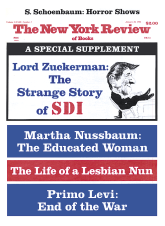In response to:
Jews, Have Pity! from the September 26, 1985 issue
To the Editors:
In your issue of September 26, 1985, a D.J. Enright reviews Leon Wieseltier’s review in The New Republic, May 20, 1985, of my chap-book, Women and Angels, which was published in a limited edition by The Jewish Publication Society of Philadelphia; and he also, in part, refers to the pieces in the book; and he does it so oddly and so unacceptably that he ought to be answered.
Mr. Enright does not like my book or me—I have never met him—but he does not contradict Wieseltier’s review to any great degree—or so it seems; the matter is not clear—and Mr. Wieseltier, blackguarding me as he goes along, refers to my work as “Brodkey’s literature” and this is, I am afraid, a major claim. Enright does not clearly disavow it so much as he takes a threatening stance towards it. Wieseltier began his review by wondering at the silence which surrounded “Brodkey’s literature” and he “sensitively” ascribed it to a prejudice against small presses. Wieseltier and I met but only once and we did not speak for more than a few minutes. In his review, he perhaps meant that I was willfully self-determined and had in my keeping a literary power I had negotiated with no one when he used the phrase “an unpleasant man.”
Now, the imputation of mediocrity to the NYR is a sorer thing than it would be for any other publication. When Enright writes that he agrees with Wieseltier that of the three pieces, “the first two pieces are chiefly impressive in establishing that Brodkey is an unpleasant man immensely alive”—and then Enright retracts the “immensely”—Enright’s remark seems to be grounded in personal knowledge of me and of my life and is supported by the authority of the NYR. A piece of writing cannot establish anything very much about its author’s life—it can supply grounds for conjecture. The issue in a review in the NYR is whether I am an unpleasant writer or not and if so why. I know of no other occasion in the last few decades on which such a remark, as a figure of speech concerning the narrative tone, or directly meant, has been applied in English in a review to a living writer. One must assume here that the reviewer and the NYR were showing off that they felt they could do as they liked in relation both to a text of mine and to my life.
Considering the extent and persistence and violence of misquotation from the stories in Enright’s review and the wild foolishness of the literary statements, including the ones of praise, and the personal and even sexual and extraordinarily intimate tone of the piece, it seems to me the NYR, when it decided to publish Enright’s review, should have placed it among its Personals. But the piece was placed among the reviews; and that calls into question the professionalism of the NYR.
To list the misquotations with the correct quotations and to correct the inaccurate or wrong literary statements in Enright’s rather short piece takes approximately nine thousand (boring) words; I’ve done it, somewhat talentlessly. And the space I would be allotted here is 3,500 words, not enough to disentangle one review from the other, not enough to deal with imputations, oddities of diction, not enough, in short, to be honest with readers. I think that being honest with readers comes first, particularly in a “shameless age” such as this one when the compact of honesty between journals of opinion and readers has so often been broken. Anyone who wants to see the rather dreary account of misquotations and foolish remarks in Enright’s piece can by writing to me at 255 West 88th Street, NYC, NY, 10024, and enclosing an addressed and stamped envelope; and I will send them the long answer. I will pay for the Xerox of the long answer, if not with pleasure, with resignation: but in the name of honesty.
I do wish that the editors of the NYR would be more direct in making public whatever it is they do think. I wish that the standards of the NYR required it of them. After all, what comes first in any given literary moment is not ever a text—now or in any literary period—but the preeminence of editors and entrepreneurs of culture. I am not being ironic. The importance of a text appears only over time and only person by person and not politically but only in relation to meaning—(and action).
Harold Brodkey
New York City
D.J Enright replies:
I am sorry Mr. Brodkey is so put out. I read his book with care, and I wrote about it carefully. From the document he offers to disseminate—a diatribe which is probably libelous in parts: but no matter—I deduce that only by quoting his text in its entirety could I have satisfied him.
I assure him that
(a) I intended no reference to his personal life, of which I am totally ignorant. But a man reveals something of himself in his writing, and my responses were similar to Leon Wieseltier’s, except that I demurred at the word “immensely” in the passage quoted above and proposed that the first two stories in the volume were “boring” rather than “nasty.”
(b) There was no hint of a conspiracy between the NYR and myself. In supposing this and in suggesting, in the lengthier document, that I was animated by “rencorous personal and professional bitterness,” Mr. Brodkey is merely flattering himself.
It is of course always possible that a critic fails to perceive the genius of the author he is reviewing. On the present occasion, being fully aware of the original and ambitious intentions of the third story, I wished I could admire the book more than I did.
This Issue
January 30, 1986



